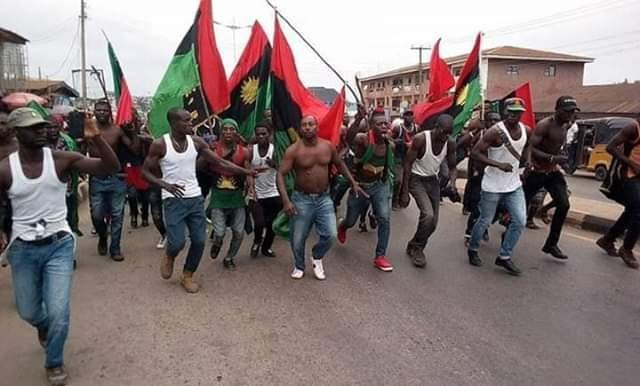
Some Igbo leaders have opposed the decision made by the Indigenous People of Biafra (IPOB) to engage in talks with the Federal Government concerning a referendum.
IPOB had previously declared its intention to negotiate with the government led by President Bola Tinubu, with the aim of peacefully facilitating Biafra’s separation from Nigeria through a United Nations-monitored referendum. According to IPOB, their pursuit of Biafra’s independence, which began in 2012, has been devoid of violence or criminal activities. Nevertheless, they allege that the Federal Government has persistently targeted their members.
Emma Powerful, the spokesperson for IPOB, affirmed their readiness to engage in negotiations with the Nigerian government whenever they are prepared to discuss the Biafra referendum.
However, these leaders have stressed the importance of a political dialogue to resolve the concerns of various Southeastern groups, including IPOB. They firmly believe that no rational Igbo individual would desire the Southeast to secede from Nigeria.
These leaders include Chief Abia Onyike, a former Ebonyi State Information Commissioner, Goodluck Ibem, the President-General of the Coalition of Southeast Youth Leaders (COSEYL), Williams Iheakolam, a political analyst, an Ohanaeze Ndigbo official, and an elder statesman who preferred to remain anonymous.
Chief Onyike, acting secretary-general of the Alaigbo Development Foundation (ADF), emphasized the urgent need for the Federal Government to engage in dialogue with all ethnic groups in the country to find a way forward. He pointed out that while IPOB supports a referendum, the Nigerian government does not share the same view. He also suggested the necessity of reconstituting the Nigerian state, moving away from the current monolithic federation towards regional autonomy, akin to the situation in 1960-1966, as the present system is oppressive and stifling.
COSEYL President Ibem argued that the maltreatment of the Igbo people is what has fueled the agitation for secession. He believed that if resources and political positions were fairly distributed in the country, no sane person would seek to exit Nigeria. He cited injustice and unfair treatment as common triggers for separatist movements worldwide, emphasizing the importance of fairness and justice for national unity.
Iheakolam expressed his belief that the Southeast’s crisis and the continued detention of Nnamdi Kanu by the Department of State Services (DSS) could be resolved through political discussions. He called upon Southeastern federal lawmakers and governors to seize the opportunity to facilitate discussions between the federal government and IPOB, recalling a similar plea made by the elder statesman, Sam Mbadiwe, during a past visit to then-President Muhammadu Buhari.
An anonymous Ohanaeze official stressed that Ohanaeze has consistently advocated for Nigeria’s restructuring to end the marginalization of certain regions. They emphasized their commitment to achieving a better and more equitable Nigeria where justice and fairness prevail, addressing the historical grievances experienced by the Igbo people.
The unnamed elder statesman emphasized that their objective is not secession but rather a call for fairness, equity, and justice. He lamented the lack of significant political representation for Igbo individuals since 1976 and emphasized the need for balanced political restructuring.
West Ham United has sacked manager Julen Lopetegui after just 22 games in charge, with…
Cristiano Ronaldo has reportedly upgraded his private jet to a Gulfstream G650, a top-tier aircraft…
The Nigerian Navy has announced the rescue of eight police officers and one civilian after…
The remains of Victor Tyohemba, his wife Mrs. Erdoo, and their two daughters, Miss Agnes…
The naira continued its decline against the dollar in the foreign exchange market on Tuesday,…
The National Spokesman of the All Progressives Congress (APC), Felix Morka, has dismissed allegations by…